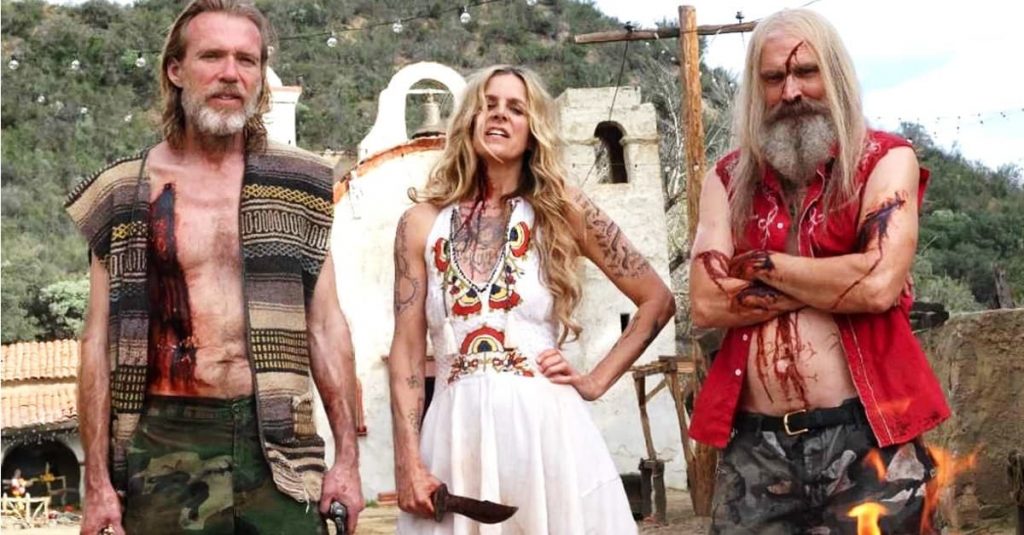
3 From Hell: The Squirmiest Worm
I’ve watched 3 from Hell twice – once with a rowdy crowd during its multi-night theatrical run, and once at home, all by myself.
And I still don’t know what to make of it. I’m honestly torn between three stars and zero stars.
In my experience, Zombie’s filmmaking appreciates with subsequent viewings. I loathedThe Devil’s Rejects when I saw it in theaters, but revisiting it several years later, admired the craftsmanship and moral complexity of the work. It’s ugly and repugnant, but purposefully so. The question is whether you want to witness what’s under the large rock in the backyard…and to his credit, Zombie doesn’t flinch from the downtrodden reality of his horrors.
But therein lies the paradox: it’s one thing to glance under the large rock in the backyard; it’s another for the local bully to grab the squirmiest worm and force it down your throat.
What I Like About Zombie
What I find consistently fascinating about Zombie’s work is its confrontational nature. From characterization to his sickening depictions of violence, he’s doing the horror genre an important service. Case in point: after viewing it theatrically, many moments from 3 from Hell were, for good and ill, branded on my frontal lobe. There are things here, as in Rejects or Halloween II or The Lords of Salem that, due to their anomalous nature, are unforgettable.
For instance, take the scene where two hunters, Tony (Bill Oberst Jr.) and Nebraska (Lucinda Jenney), come across a sprung-from-prison Otis Driftwood (Bill Moseley) and his accomplice, Winslow Foxworth Coltrane (Richard Brake). The hunters are looking to pocket a reward for apprehending the criminals. Coltrane distracts Tony with a vulgar sexual anecdote that allows Otis to get the upper hand. The sequence seems to end with a bloody money shot sprayed onto Nebraska, but Zombie goes one further, cutting away to the character’s severed face stuck to a tree trunk. The hunters’ identification of the convicts leads to their physical forms being violently distorted into something unrecognizable.
Another thing I like about Zombie is his ability to start a story on a certain path, but create a world so brutal that, by the end, you feel as beaten and exhausted as whomever’s left alive. There are many current horror filmmakers creating indelible works (Oz Perkins and Robert Eggers, to name two), but none push your face into the proverbial muck with as much aggression as Zombie.
To what end, though? 3 from Hell left me wondering.
Stagnant Waters
On one hand, there’s the frustration of a filmmaker slogging through stagnant waters. The Devil’s Rejects was an early triumph for Zombie – a gritty, dirty, and bloody effort full of moral paradoxes and confrontational carnage. It was a horror-western-road movie that brought the Firefly Family to a logical and satisfying end.
3 from Hell reheats Rejects‘ story beats, and when you contrast what’s lazy about it to what’s genuinely good, it puts a biased fan such as myself in a pickle.
I like Zombie’s suggestion that the Firefly Family is the last vestige of purity in a corrupt America. They are remorseless and subhuman killers, for sure, but his manner of paralleling them against the systemic faults of the suit-and-tie bureaucracy carries a certain relevance and validity. In a sense, Zombie is pitting his poor white trash against a system that’s predisposed toward their suppression and elimination. The presence of an Indian headdress in Warden Virgil Harper’s (Jeff Daniel Phillips) home serves as a reminder that the notion of “civilization” is wrested through bloodshed. It’s fitting, then, that Baby (Sheri Moon Zombie) co-opts the headdress for the film’s third-act massacre, as it represents a reclamation of sorts.
But then you have the Zombie who can’t resist shrill F-bombs, toilet humor, Southern-rock soundtrack cuts, and playing a scene of a nude woman getting stabbed to death for cringeworthy yuks.
Subverting Expectations
Then again, I like how he subverts expectations in the early going: presenting the perseverance of the Firefly clan as a curse visited upon the earth (and their own existence). I appreciated Captain Spaulding’s (the late Sid Haig) final monologue, followed by an off-camera fate. To give a key member of this seemingly indestructible horror trio an abbreviated – and ultimately very mortal – end is more artistically daring than any of the physical carnage on display. This is paralleled by the demise of Rondo (Danny Trejo), who’s killed by Otis at a prison work site. The depiction of death is cold, quick, and unceremonious.
But then I go back to the cringeworthy stuff. At nearly 2 hours, 3 from Hell suffers from painfully improvised scenes (the “Bogart and Cagney” exchange), base-level battle-of-the-sexes stuff (a knife-throwing contest between Baby and two buff Mexicans), and go-nowhere asides (a murder at a motel soda machine). Clint Howard gets the worst of the cult-actor cameos, showing up as a party clown who rings the wrong doorbell.
The film is more focused at the beginning: I was disappointed that the entire plot didn’t center around the corrupt politics of prison life and how the Fireflys approach it. That, and Dee Wallace’s iconic portrayal of a sadistic lesbian guard could’ve been pushed to even greater extremes (someone give her an Ilsa-style trilogy!). For a guy who’s shown such proficiency with the aesthetics of ‘70s grindhouse, it’s surprising that the prison scenes only comprise the first third.
A Well Beaten Horse
The hostage sequence with Warden Harper, his parole-board crony, and their wives is a blatant echo of the hotel hostage sequence in Rejects. I like how Zombie injects some commentary into this portion of the film, recalling the sly socioeconomic statements of House on the Edge of the Park. Here, the facade of law and order, combined with the spoils of an upper-class lifestyle, fails to save the authority figures. The complacency brought on by the lie of “the American success story” is undermined by the uncompromising purity of primal violence.
But then again…I’m very tired of America romanticizing Charles Manson and the Family. Zombie can’t resist name-dropping and paralleling his characters to Manson, in an attempt at…what, exactly? Some sort of real-world validation? Shock value? It’s another well-beaten, maggot-eaten horse.
Perhaps Zombie’s most interesting touch comes in the Mexico-set third act. As the vengeance-seeking son of Rondo, Aquarius (Emilio Rivera) is a welcome contrast to the shrill redneckery of the Fireflys. Imposing body language and a soft-spoken delivery carries his unfortunately underdeveloped character. Had Aquarius been introduced earlier, he could’ve proven a formidable, multi-faceted foe; as it stands, he’s simply formidable. As one-eyed artist Sebastian, Pancho Moler (31) brings an innocence and empathy to the proceedings, and his scene with Baby brings the most palpable feelings of humanity to the surface.
The Better Rob Zombie Movie
In many ways, Todd Phillips made the better Rob Zombie movie of 2019 with Joker. A throwback to the gritty aesthetics of 1970s major-studio efforts, it delivered a daring character study predicated on the transformative physical skill of Joaquin Phoenix. It rarely indulged cheap humor, opting instead for the disagreeable tragedy of its unlikable protagonist.
Going beyond the episodic presence of Heath Ledger’s Joker in The Dark Knight, Phoenix’s portrayal becomes overwhelming, uncomfortable, and flat-out horrifying. While Phillips had a large budget to create his urban hellscape, he retains a sense of control throughout (even as events tumble into disorder). It may be an unfair comparison (considering the paltry $3 million budget for 3 from Hell), but Zombie just over-indulges the excesses he’s vomited out numerous times before.
I think Zombie is a talented guy for the reasons I’ve threaded throughout this review. As an aesthetician, he understands the appeal of drive-in sleaze much better than Tarantino did in Death Proof. The Lords of Salem showed him venturing out of his backwoods comfort zone to deliver something otherworldly. I know he has another great movie in him – maybe a bunch – but he’ll need to kill his darling Fireflys (for real this time) to get to that point.
2 out of 5 stars
The Plot Sickens: Stay awake with Jonny Numb’s review of Doctor Sleep!
Crash Analysis Support Team
Jonny Numb

Jonny Numb (aka Jonathan Weidler) never learned how to swim, but can float just fine. He co-hosts The Last Knock podcast with Billy Crash, and can be found in the social-media sewers of Twitter and Letterboxd @JonnyNumb.
Get your Crash Palace and The Last Knock gear! 
THE LAST KNOCK horror podcast is a Crash Palace Productions’ featured show. Besides this site, you can find THE LAST KNOCK on iTunes with new shows posted every other Sunday at 9 PM ET.
Crash Palace Productions website design and creation from Brian Yount Digital Enterprises with banner and THE LAST KNOCK art from Palko Designs. Logo designs from Paul Belci.
(3 From Hell still from Lionsgate.)
